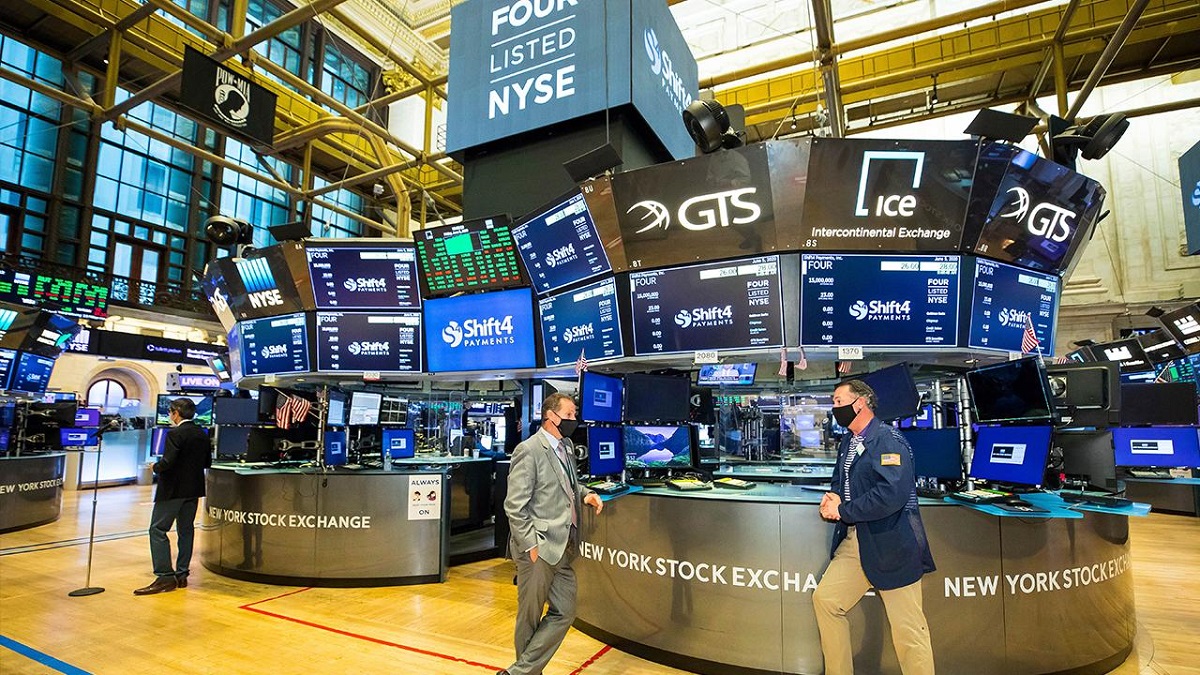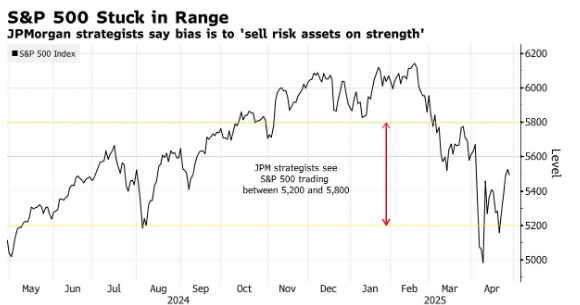JPMorgan vs. Morgan Stanley: A Diverging Views on US Stocks Amid Trade and Economic Outlook
The US stock market has been a rollercoaster in recent weeks, with trade policy developments and economic data fueling sharp swings in equity prices. On Monday, the S&P 500 Index dropped as much as 1%

The US stock market has been a rollercoaster in recent weeks, with trade policy developments and economic data fueling sharp swings in equity prices.
On Monday, the S&P 500 Index dropped as much as 1% in afternoon trading, while the Nasdaq 100 Index fell 1.4%. This followed a robust rally the previous week, marking the second-best week for US equities in 2025, driven by Trump’s optimistic updates on trade negotiations.
Against this volatile backdrop, analysts from major financial institutions have offered their takes, blending cautious optimism with warnings of potential challenges ahead.
JPMorgan Traders Turn Bullish on US Stocks But Warn of Pain to Come
JPMorgan Chase & Co.’s trading desk has taken a tactically bullish stance on US equities, betting that factors like strong Big Tech earnings and trade deal announcements will prop up stocks following a recent market rout.
In a Monday note to clients, head of global market intelligence at jpmorgan, wrote, “Overall, the de-escalation trade has room to run.” However, he tempered this optimism, noting that the rally’s momentum could wane within weeks as the negative effects of US tariffs begin to weigh on the economy.
The global market intelligence team, previously “tactically bearish” on US stocks, bases this shift largely on technical factors rather than fundamentals. “The combination of light positioning, low liquidity, subdued investor participation means that this market is likely to drift higher in the absence of negative news such as tariff headlines or a spike in bond yields,” they explained.
They also see potential trade deals as a positive skew for the risk-reward outlook. Treasury Secretary Scott Bessent reinforced this on Monday, stating that the US is prioritizing trade agreements with 15 to 17 countries while sidelining China, leaving it to Beijing to de-escalate the tariff dispute given the trade imbalance.
The team anticipates a boost from megacap tech earnings, with companies like microsoft Corp., apple inc., Meta Platforms Inc., and Amazon.com Inc.—part of the “Magnificent Seven”—set to report this week.
These firms are expected to deliver an average profit growth of 15% in 2025, a forecast holding steady despite trade tensions. Yet, head of global market intelligence at JPMorgan cautioned, “We are still 1-2 months away from seeing the negative impact of the trade war on the real economy,” aligning with broader Wall Street concerns about upcoming economic data. Separately, JPMorgan’s equity research team projects the S&P 500 to trade between 5,200 and 5,800 points, depending on trade headlines and recession fears. They recommend “a bias to sell risk assets on strength rather than chasing the momentum,” awaiting clearer trade policy signals.

Morgan Stanley’s Wilson Says Weak Dollar Will Buoy US Stocks
Morgan Stanley’s Michael Wilson offers a different angle, arguing that a weakening dollar will bolster US corporate earnings, positioning the US stock market to outshine global peers.
While many Wall Street strategists question the longevity of US exceptionalism, Wilson remains confident in America’s edge, citing less volatile earnings growth and higher-quality companies. “We remain in a late cycle backdrop where both quality and large-cap relative outperformance should continue,” he wrote in a Monday note.
Wilson predicts the S&P 500 will hover between 5,000 and 5,500 points. For a more significant upswing, he says, a tariff deal with China, a rebound in earnings estimates, and possibly looser Federal Reserve monetary policy would be necessary.
His view contrasts with broader caution on Wall Street, where analysts like one of equity researcher from JPMorgan favor international stocks, arguing they offer better risk-reward if Trump eases tariffs and recession risks persist. Societe Generale’s researcher warns that continued trade aggression from Trump could prompt investors to cut US stock and dollar exposure. Bank of America strategists echoed this last week, advising clients to sell into rallies, citing insufficient conditions for sustained gains.

Conclusion
Wall Street’s latest analyses paint a complex picture for the US stock market. JPMorgan sees short-term upside driven by technicals and trade optimism but flags tariff-related risks ahead. Morgan Stanley bets on a weak dollar and US quality to sustain outperformance, though with caveats for bigger gains. Meanwhile, other voices urge caution, favoring international markets or defensive moves.
As trade developments, earnings, and economic data unfold, investors face a market where opportunity and uncertainty remain tightly intertwined.
Disclaimer: The views in this article are from the original Creator and do not represent the views or position of Hawk Insight. The content of the article is for reference, communication and learning only, and does not constitute investment advice. If it involves copyright issues, please contact us for deletion.